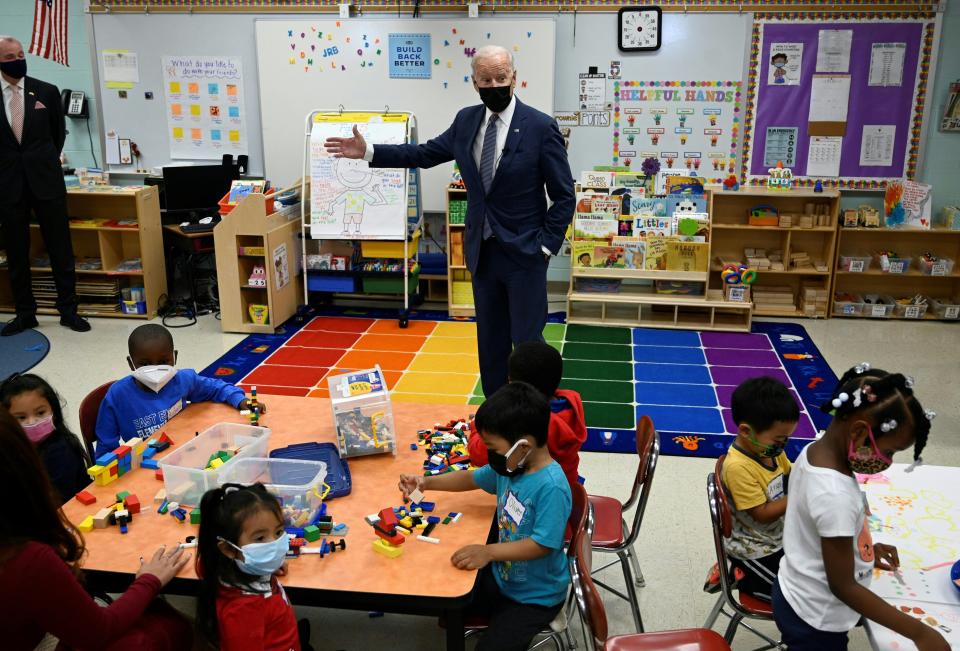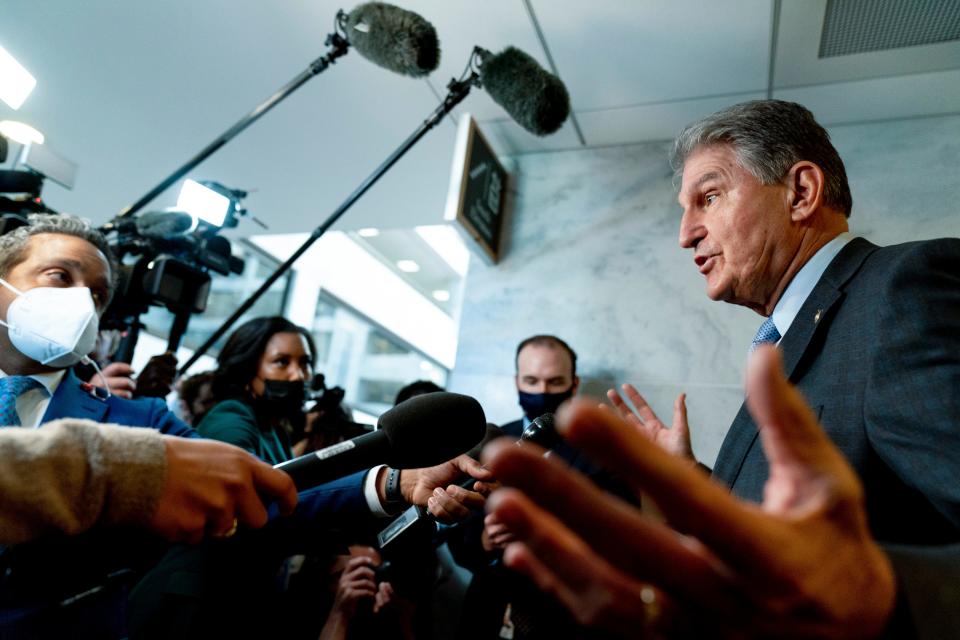Many programs in Biden's budget have expiration dates. What that means for health insurance, preschool
- Oops!Something went wrong.Please try again later.
WASHINGTON – Historic. Transformational. A once-in-several-generations opportunity. Those are some of the ways the White House is describing the scope of the massive package of domestic policy programs pending in Congress.
But one word the administration can’t use for some of the initiatives included in the framework President Joe Biden released last week? Permanent.
After as little as one year, parts of the expanded social safety net would turn back into pumpkins unless a future Congress acted to continue them.
Increased tax credits for low-income families and for households with children would end after a year.
Extra health insurance subsidies for millions of lower- and middle-income patients would only last through 2025.
Funding for universal preschool for all 3- and 4-year-olds would expire after six years, as would funding to make child care more affordable.
Policy advocates worry that uncertain future funding will make programs unstable, keeping them from being fully used or potentially yanking away support after families begin to rely on it.

Will Marshall, president of the Progressive Policy Institute, said his group is concerned that the latest version of the package “tries to do too much with too little” instead of “prioritizing a few robust and transformative initiatives.”
And fiscal watchdogs decry the expiration dates as budget trickery to squeeze more programs into a less-expensive package and hide the true cost.
“Unfortunately, the framework relies heavily on the massive gimmick of arbitrary sunsets to make the numbers work,” said Maya MacGuineas, president of the Committee for a Responsible Federal Budget.
More worrisome for Biden, Sen. Joe Manchin, D-W. Va., on Monday said the "shell games" and "budget gimmicks" that mask the true cost of the measure if all provisions become permanent are a "recipe for economic crisis."
"I will not support the (legislative package) without knowing how the bill will impact our debt and our economy and our country," said Manchin, one of the two Senate Democrats who have not publicly committed to voting for the bill.

White House press secretary Jen Psaki said in a statement that the administration remains confident the plan will gain Manchin's support. She said the package is fiscally responsible because "it is fully paid for, will reduce the deficit, and brings down costs for health care, child care, elder care, and housing."
What's in Biden's latest budget offer: Climate programs and universal preschool, but no paid leave
Time and budget constraints tied Democrats' hands
Democrats felt the pressure to cram as much as possible into the package because, to avoid a GOP filibuster, they must employ a Senate procedure that doesn’t allow for multiple bites of the apple. In addition, Democrats could lose their already narrow hold on the House and the Senate in next year’s midterm elections, ramping up the urgency to pass high-priority policies now.
They added the constraint that new funding must be offset with new revenue, rather than adding to the already massive federal debt as lawmakers did when passing the $1.9 trillion coronavirus relief package in March.
But more moderate members of the party balked at some of the potential offsets – both new taxes as well as reducing how much the federal government reimburses pharmaceutical companies for prescription drugs. Moderates also objected to the overall size of Biden’s domestic agenda.
While some expensive initiatives were left out of the latest version – including paid family leave and free community college – others were left in but given expiration dates. The gamble is that they will become popular enough that lawmakers will want to extend them in a few years, with or without budgetary offsets.
That was the approach Democrats took to portions of the massive March bill. One of the most expensive parts of that bill, expanding the child tax credit, ends in December. If the framework released by the White House for the latest package becomes law, the expansion would continue another year, as would a temporary boost in tax credits for low-income workers without children.
The March package also temporarily increased premium subsidies for people who buy health insurance on their own instead of getting it through an employer or the government. Instead of ending after 2022, that boost would continue through 2025 under the latest proposal. New private insurance assistance would also become available, but just through 2025, for people in poverty in the 12 states that haven’t expanded Medicaid eligibility under the 2010 Affordable Care Act.
The pending framework also includes six years of phased-in funding for free preschool for all 3- and 4-year-olds and to help families afford child care.

”
The preschool and child care programs also need buy-ins from states, which might be reluctant to participate.
“We are definitely going to be pushing to make these investments permanent,” said Ai-jen Poo, senior adviser to the advocacy group Care in Action, “because we understand that temporary funding can be incredibly challenging for states that are trying to modernize their systems. And we believe that child care is a permanent need that should be invested in this country.”
Not a new trick
Expiration dates on expensive policies aren't just a Democratic move.
When Republicans cut taxes in 2017, the corporate tax rate was permanently lowered but most of the individual tax cuts were set to expire after 2025.
Still, that didn’t keep Missouri Rep. Jason Smith, the top Republican on the House Budget Committee, from attacking Democrats for relying “strongly on early sunsets of costly programs to make the price tag appear smaller on paper.”
“Publicly, however, Democrats have repeatedly called for the permanent expansion of these programs, such as the Child Tax Credit, universal Pre-K, and extending Affordable Care Act subsidies,” Smith said in a statement. “When you remove the budget gimmicks from the equation and extend these provisions, as Democrats have repeatedly called for, it will add an additional $2.1 trillion in spending.”
Maureen Groppe has covered Washington for nearly three decades and is now a White House correspondent for USA TODAY. Follow her on Twitter @mgroppe.
This article originally appeared on USA TODAY: Biden's domestic agenda isn't permanent, including parts of safety net

